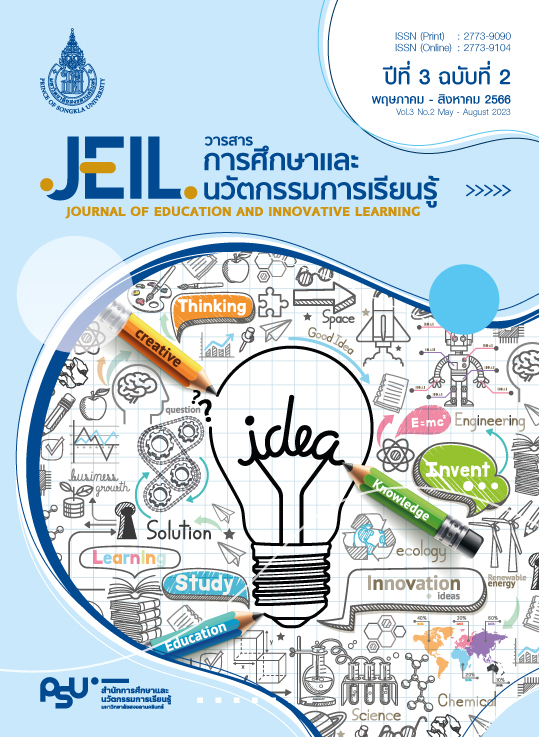ผลของการใช้โมบายเลิร์นนิงร่วมกับการเรียนรู้แบบเน้นภาระงานเพื่อพัฒนาความสามารถใน การอ่านภาษาอังกฤษของนักเรียนชั้นมัธยมศึกษาปีที่ 5
Main Article Content
บทคัดย่อ
บทความวิจัยนี้มีวัตถุประสงค์เพื่อเปรียบเทียบผลสัมฤทธิ์ทางการเรียนและศึกษาความพึงพอใจของนักเรียนที่มีต่อการใช้โมบายเลิร์นนิงร่วมกับการเรียนรู้แบบเน้นภาระงานในการพัฒนาความสามารถในการอ่านภาษาอังกฤษ กลุ่มตัวอย่าง ได้แก่ นักเรียนชั้นมัธยมศึกษาปีที่ 5 ภาคเรียนที่ 2 ปีการศึกษา 2565 จำนวน 81 คน ซึ่งได้มาจากการเลือกแบบเจาะจง เครื่องมือที่ใช้ในการวิจัยครั้งนี้ ได้แก่ 1) เครื่องมือที่ใช้ในการทดลอง คือ แผนการจัดการเรียนรู้ด้วยการใช้โมบายเลิร์นนิงร่วมกับการเรียนรู้แบบเน้นภาระงานเพื่อพัฒนาความสามารถในการอ่านภาษาอังกฤษ แผนการจัดการเรียนรู้แบบปกติ และบทเรียนโมบายเลิร์นนิง 2) เครื่องมือที่ใช้ในการเก็บรวบรวมข้อมูล คือ แบบทดสอบวัดความสามารถในการอ่านภาษาอังกฤษ และแบบประเมินความพึงพอใจ ผลการวิจัยพบว่า 1) ผลสัมฤทธิ์ทางการเรียนของนักเรียนที่เรียนด้วยการใช้โมบายเลิร์นนิงร่วมกับการเรียนรู้แบบเน้นภาระงานในการพัฒนาความสามารถในการอ่านภาษาอังกฤษสูงกว่านักเรียนที่เรียนแบบปกติอย่างมีนัยสำคัญทางสถิติที่ระดับ .05 2) ผลการประเมินความพึงพอใจของนักเรียนที่มีต่อการใช้ โมบายเลิร์นนิงร่วมกับการเรียนรู้แบบเน้นภาระงานในการพัฒนาความสามารถในการอ่านภาษาอังกฤษ พบว่านักเรียนมีความพึงพอใจโดยรวม อยู่ในระดับมากที่สุด
Article Details

อนุญาตภายใต้เงื่อนไข Creative Commons Attribution-NonCommercial-NoDerivatives 4.0 International License.
เนื้อหาและข้อมูลในบทความที่ตีพิมพ์ในวารสารการศึกษาและนวัตกรรมการเรียนรู้ ถือเป็นข้อคิดเห็นและความรับผิดชอบของผู้เขียน ซึ่งกองบรรณาธิการวารสาร ไม่จำเป็นต้องเห็นด้วยหรือร่วมรับผิดชอบใด ๆ และไม่สงวนสิทธิ์การคัดลอกบทความเพื่อใช้ประโยชน์ทางวิชาการ แต่ให้อ้างอิงข้อมูลแสดงที่มาของบทความทุกครั้งที่นำไปใช้ประโยชน์
เอกสารอ้างอิง
Baiya, C., Boonprasan, A., & Plangsorn, B. (2022). Learning management using M-learning for english subject. Journal of Education and Innovative Learning, 2(3), 285-302. [in Thai]
Bangkok University Research Center. (2019). The New Generation of Thai Children Smartphone with Smart Hearts. Retrieved from https://bangkokpoll.bu.ac.th/poll/result/poll883.php?pollID= [in Thai]
Kamonsawad, R. (2021). Main idea for reading. Retrieved from https://bsru.net/author/ruedee-ka [in Thai]
Komjit, M., & Saengiun, W. (2016). Development of task-based learning management in home economics course for mattayomsuksa 2 students at Kasetsart University laboratory school, Center for Educational Research and Development. Kasetsart University Review, 31(1), 135-146. [in Thai]
Ministry of Education. (2008). Basic Education Core Curriculum B.E. 2551 (A.D. 2008). Retrieved from http://academic.obec.go.th/images/document/1559878925_d_1.pdf [in Thai]
Sangtip, W. (2021). The development of learning by using gamification with task-based learning to enhance english reading comprehension and learning motivation of matthayom 3 students (Master’s thesis). Silpakorn University, Thailand. Retrieved from http://ithesis-ir.su.ac.th/dspace/bitstream/123456789/3553/1/620620070.pdf [in Thai]
Sirisukpoca, U., & Krootjohn, S. (2020). Development of mobile application to enhance english pronunciation skill with flipped classroom technique for 3rd grade students. Technical Education Journal: King Mongkut’s University of Technology North Bangkok, 10(2), 227-236. [in Thai]
The Secretariat of the Educational Technology Development Fund Office. (2019). Educational Technology Development Fund's Strategic Plan B.E. 2563-2565 (A.D 2020-2022). Retrieved from http://edf.moe.go.th/web/wp-content/uploads/2019/11/P1.pdf?fbclid=IwAR2vc1KQ2Hu3feZEYOUo2wHRcCBm1j9v4k1GlL6Wm2aP0VgPakroaOCl4gc [in Thai]


